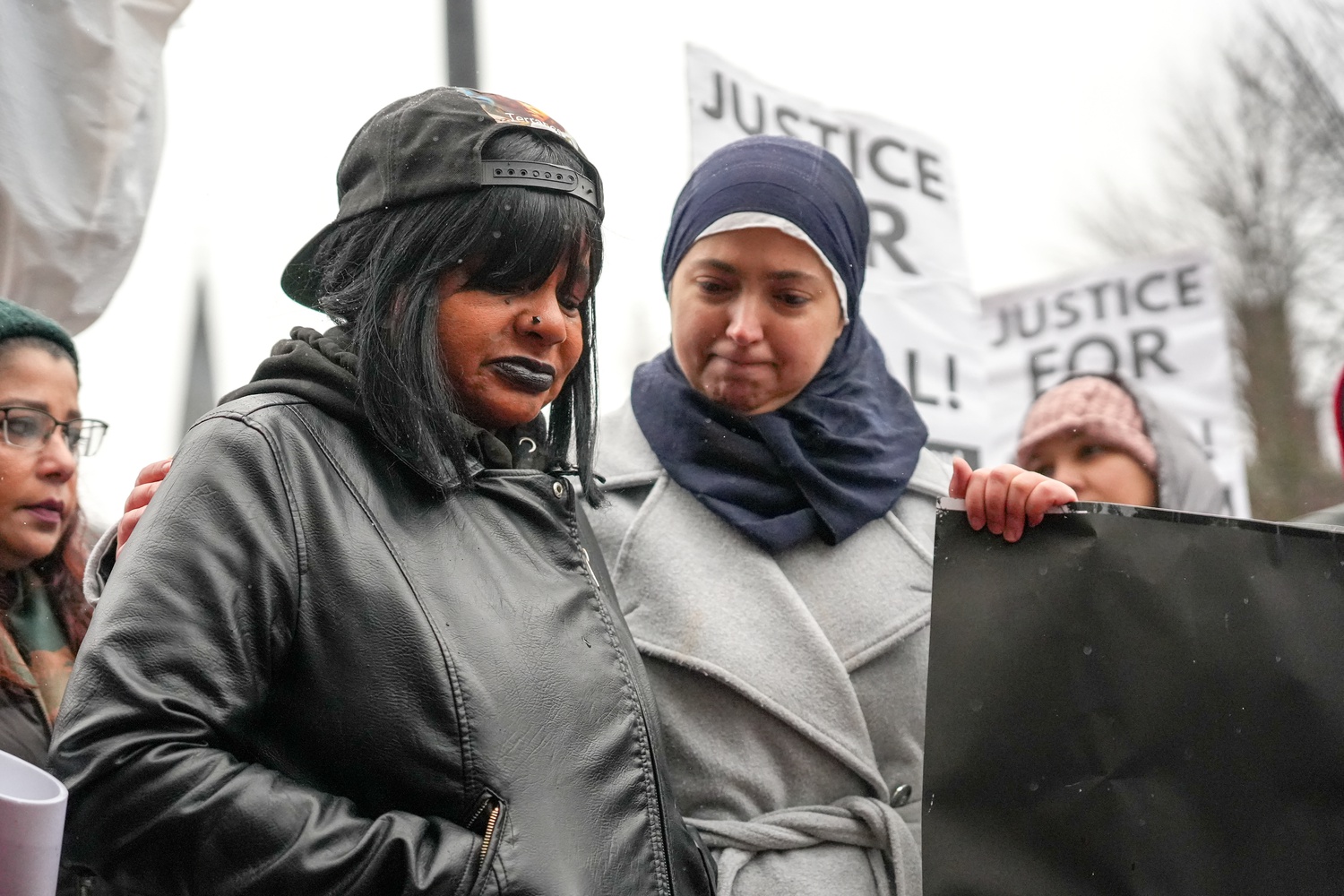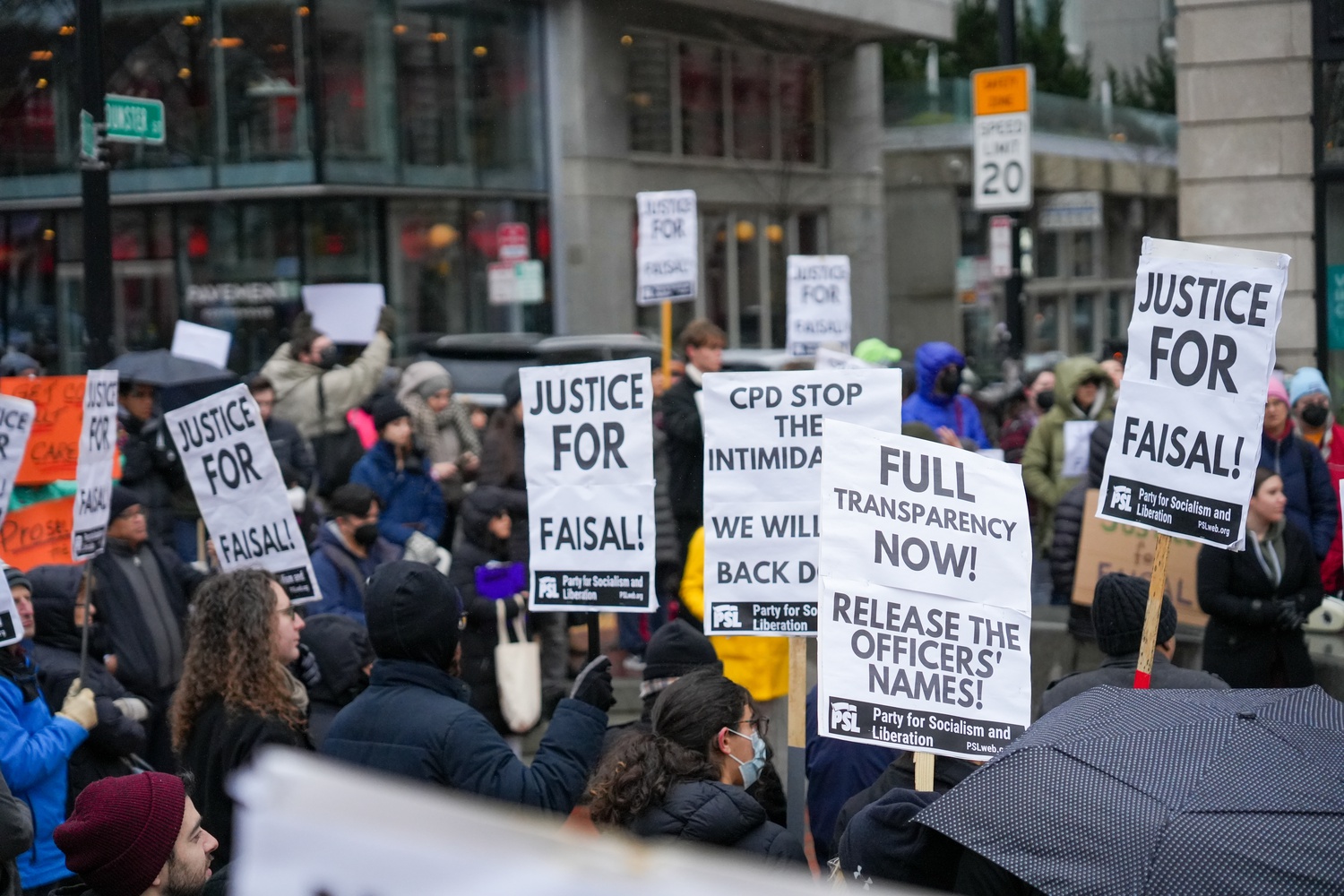
News
Summers Will Not Finish Semester of Teaching as Harvard Investigates Epstein Ties

News
Harvard College Students Report Favoring Divestment from Israel in HUA Survey

News
‘He Should Resign’: Harvard Undergrads Take Hard Line Against Summers Over Epstein Scandal

News
Harvard To Launch New Investigation Into Epstein’s Ties to Summers, Other University Affiliates

News
Harvard Students To Vote on Divestment From Israel in Inaugural HUA Election Survey
‘Faisal Deserved Help, Not Bullets’: Harvard Affiliates, Cambridge Residents Mourn Sayed Faisal at Harvard Square Protest

Politicians, academics, and Cambridge residents crowded the Harvard Square Pit Saturday as they demanded justice for Sayed Faisal, a college student who was shot and killed by a Cambridge Police Department officer on Jan. 4.
Despite chilly weather that froze downpour into a relentless hail, more than a hundred people showed up to the Saturday demonstration, which was organized by the Bangladesh Association of New England in memory of Faisal, a Cambridge resident.
Faisal, a 20-year-old Bangladeshi American student at the University of Massachusetts Boston, was killed earlier this month by a Cambridge Police officer. According to a CPD press release, officers responded to a 911 caller who reported that a man had jumped through a window. After a foot chase through several blocks in Cambridgeport, Faisal allegedly moved toward police wielding a knife. When a sponge round failed to stop him, the officer shot and killed him.
Faisal’s death has received international attention and ignited city-wide conversations on mental health, policing practices, and systemic racism.
During the protest, South End resident Hope Coleman recounted how her only son, Terrence Coleman, was shot twice in their apartment by Boston Police after she called 911 for an ambulance. Voices hushed as Hope Coleman spoke in visible pain, tears streaming down her face.
“I feel so bad that I called 911, and he’s not here today,” Coleman said, her voice breaking. “He died in my hallway, not on the way to the hospital. They need to tell the damn truth.”
A 2017 investigation into the fatal shooting found the BPD officer who killed Terrence Coleman lawfully used deadly force after Coleman swung a kitchen knife at officers and medical staff. In a report, the Suffolk County District Attorney wrote that the shooting was “a lawful exercise of self-defense and defense of others.”
Hope Coleman called for the creation of a mental health crisis hotline, arguing that police officers are unequipped to respond to mental health emergencies. The police response that ultimately led to Faisal’s death was prompted by a 911 caller who reported that Faisal was harming himself, according to a CPD statement.

Massachusetts State Rep. Michael L. Connolly criticized a raucous city-held meeting that lasted nearly four hours Thursday for not providing “any answers” and called for the channeling of funds from CPD to the Holistic Emergency Alternative Response Team, a traditional policing alternative.
“In a moment of crisis, everything was taken away from [Faisal], his family, our community,” Connolly said. “The system failed. The Cambridge Police failed. Our community has to do better.”
Massachusetts State Rep. Erika Uyterhoeven, who said she ran her campaign on defunding the police, told attendees that “true liberation and freedom” requires prison and police abolition.
Amanda Rosanna, a responder for Cambridge HEART, said Faisal’s death was preventable.
“It is clear to us that if a skilled, trauma-informed practitioner was called to the scene instead of police, Faisal’s behavior could have been fully deescalated with words,” Rosanna said. “Faisal deserved help, not bullets.”
Rosanna told protesters that while HEART had not received “a single penny” from the city in the three years that it has asked, Cambridge increased the police budget from $69 million to $73 million in 2022, prompting a wave of boos.
Sharik, an organizer with the Party for Socialism and Liberation and the Boston South Asian Coalition, criticized CPD for placing the officer who killed Faisal on paid leave, calling the move “a paid vacation.”
Sharik also demanded the city release the officer’s name, comparing the shooting to other police killings throughout the country.
“Release the names of the cops,” Sharik said as attendees yelled in agreement. “The whole world knows Derek Chauvin killed George Floyd. We need to know who killed Arif Faisal.”

District Attorney Marian T. Ryan and Cambridge Police Commissioner Christine A. Elow told residents during Thursday’s public meeting that details like the names of the officers involved and the specifics of the interaction cannot be released until the DA’s investigation is complete. Elow would not confirm some previously announced details, including the type of knife Faisal allegedly carried.
In a Monday statement to The Crimson, CPD spokesperson Jeremy C. Warnick wrote that the officer, who has worked with the department for seven years, has never before received a complaint.
Jamal Halawa, a Somerville High School teacher who taught Faisal, said the school “is really broken up” about Faisal’s death. He read statements from teachers who called Faisal “a benevolent young man with a big heart” and “a joy to teach.”
“Mr. Blake said, ‘He wasn’t always on top of his schoolwork, but he was always good-natured and honest about it,’” Halawa told attendees, prompting chuckles from some.
Maria Khwaja, who taught Faisal in his senior year English class, shared how she bonded with the “soft-spoken kid” over Ramadan as a South Asian Muslim and recalled his surprise when she and other teachers showed up at his house to give him balloons and a graduation card during the 2020 pandemic.
When Khwaja read the news of his shooting, she said she couldn’t believe it was Faisal.
“I sat in my garage, and I cried for 30 minutes because this kid should have been okay,” she said. “I’ve been teaching a long time. I’ve lost students to overdoses. I’ve lost students to accidents. I have never lost a student like this.”

The Saturday rally, which lasted over an hour, was punctuated with impassioned chants of “Justice for Faisal.” Demonstrators waved signs reading “Full Transparency Now!” and “CPD Stop the Intimidation.”
“Last week, I sat in the home of the family and looked into the eyes of Faisal’s mother as tears poured down, and I heard the cry of her heart,” said Nichole Mossalam, the founding director of the Islamic Cultural Center of Medford. “That cry was for justice.”
In a post-rally interview, Harvard Yiddish preceptor Sara M. Feldman told The Crimson that she was “moved” by the display of emotions and solidarity at the protest. Still, she said she wishes to see more action on Harvard’s campus as students return from break.
“The people at Harvard University should be very, very concerned about this incident of murder,” Feldman, an advocate for prison abolition, said. “There are a lot of international students at Harvard. There’s a lot of students of color. There’s a lot of students we all know — especially since Covid — with mental health troubles.”
“This is the worst thing that could have happened. This is people sent and paid for by the state coming and killing somebody in need. How could it be worse?” she added.
Several demonstrations are set to follow. On Jan. 16, Mass Action Against Police Brutality will hold a march from Boston to Cambridge, accompanied by a car caravan, to demand justice for victims of police violence. On Jan. 21, BANE will protest at the Middlesex County District Attorney’s Office in Lowell, Mass.
The Cambridge City Council will convene a special meeting on Jan. 18 to discuss CPD protocols and training.
Correction: January 30, 2023
A previous version of this article incorrectly named Sayed Faisal’s former high school English teacher. Her name is Maria Khwaja, not Maria Jamari.
Update: February 2, 2023
This article has been updated to reflect concerns from organizers about potential harm stemming from identification.
—Staff writer Ryan H. Doan-Nguyen can be reached at ryan.doannguyen@thecrimson.com. Follow him on Twitter @ryandoannguyen.
Want to keep up with breaking news? Subscribe to our email newsletter.
